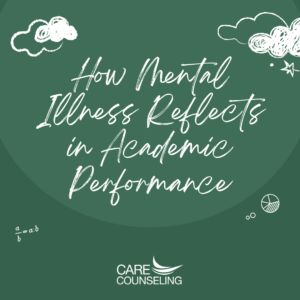How Mental Illness Reflects in Academic Performance
 Education serves as a mirror reflecting various facets of our lives. Among these, mental health occupies a significant place, profoundly impacting academic performance. The intricate relationship between mental illness and academic success is a critical topic that warrants exploration. In this blog post, we’ll delve into how mental illness can be reflected in academic performance, shedding light on the hidden signs, challenges, and strategies for educators and students alike.
Education serves as a mirror reflecting various facets of our lives. Among these, mental health occupies a significant place, profoundly impacting academic performance. The intricate relationship between mental illness and academic success is a critical topic that warrants exploration. In this blog post, we’ll delve into how mental illness can be reflected in academic performance, shedding light on the hidden signs, challenges, and strategies for educators and students alike.
The Silent Interplay: Mental Illness and Academic Performance:
- Concentration and Focus:
– Mental illnesses like anxiety and ADHD can hinder concentration and focus. Students might struggle to engage with lessons, complete assignments, or maintain sustained attention.
- Motivation and Engagement:
– Depression often saps motivation and enthusiasm. Students may lose interest in subjects they once enjoyed, leading to reduced participation and effort.
- Memory and Retention:
– Mental health struggles can impact memory and information retention. Students might find it challenging to recall concepts, dates, or details during exams.
- Time Management:
– Mental illnesses can disrupt organizational skills and time management. Students might struggle with planning, setting priorities, and meeting deadlines.
- Test Anxiety:
– Test anxiety, a common manifestation of mental health issues, can lead to underperformance during exams. Students may experience panic, mental blocks, or difficulty recalling information under pressure.
- Absences and Disruptions:
– Mental health challenges might lead to increased absenteeism due to symptoms or appointments. Missed classes can result in gaps in knowledge and understanding.
Recognizing the Signs: How Mental Illness Reveals Itself:
- Changes in Performance:
– A sudden decline in grades, previously uncharacteristic mistakes, or inconsistency in performance could be indicative of underlying mental health struggles.
- Lack of Engagement:
– Students who were previously engaged but become disinterested or detached may be grappling with mental health issues.
- Isolation and Withdrawal:
– If a student starts isolating themselves from peers, avoiding group activities, or no longer participating in class discussions, it might be a sign of social anxiety or depression.
- Visible Stress:
– Noticeable signs of stress, such as excessive worrying, restlessness, or irritability, might point toward underlying anxiety disorders.
- Physical Symptoms:
– Frequent headaches, stomachaches, fatigue, or changes in sleep patterns can be physical manifestations of mental health challenges affecting academic performance.
Strategies for Educators:
- Create a Supportive Environment:
– Foster an inclusive classroom atmosphere where students feel comfortable discussing their challenges, both academic and personal.
- Educate on Mental Health:
– Integrate mental health awareness into the curriculum. Educate students about common mental health issues, reducing stigma and encouraging empathy.
- Offer Flexibility:
– Recognize that some students may require flexibility due to their mental health. Adjust deadlines, offer extensions, or provide alternative assessment methods.
- Encourage Open Communication:
– Let students know you’re open to conversations about their struggles. Encourage them to reach out if they need support or accommodations.
- Refer to Support Services:
– Familiarize yourself with the school’s mental health resources and refer students to counselors or professionals when necessary.
Strategies for Students:
- Seek Help:
– If you’re experiencing mental health challenges, don’t hesitate to seek help from a counselor, therapist, or a trusted adult.
- Practice Self-Care:
– Prioritize self-care through activities like exercise, mindfulness, and maintaining a healthy routine. These practices support mental well-being.
- Advocate for Yourself:
– If you need accommodations due to mental health, communicate your needs to your educators and school support services.
- Set Realistic Goals:
– Establish achievable academic goals, considering your mental health. Break tasks into smaller steps to manage overwhelm.
- Build a Support Network:
– Surround yourself with friends, family, and mentors who understand and support your mental health journey.
Mental health is a powerful determinant of academic performance. By recognizing the ways in which mental illness can manifest in educational settings, educators and students can take proactive steps to address challenges and seek the necessary support. Creating an environment of understanding, empathy, and open communication not only improves academic outcomes but also contributes to the well-being of students.



























